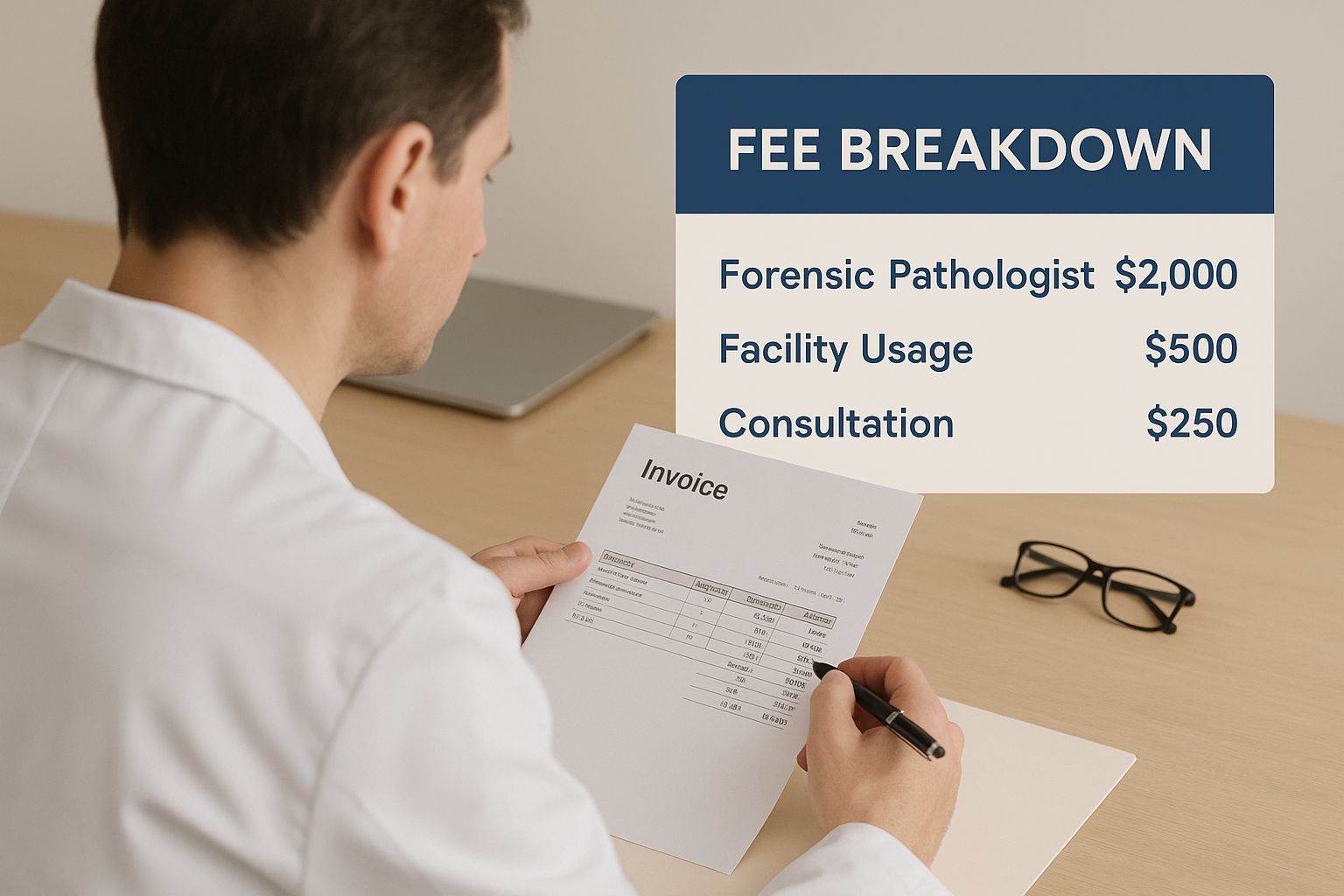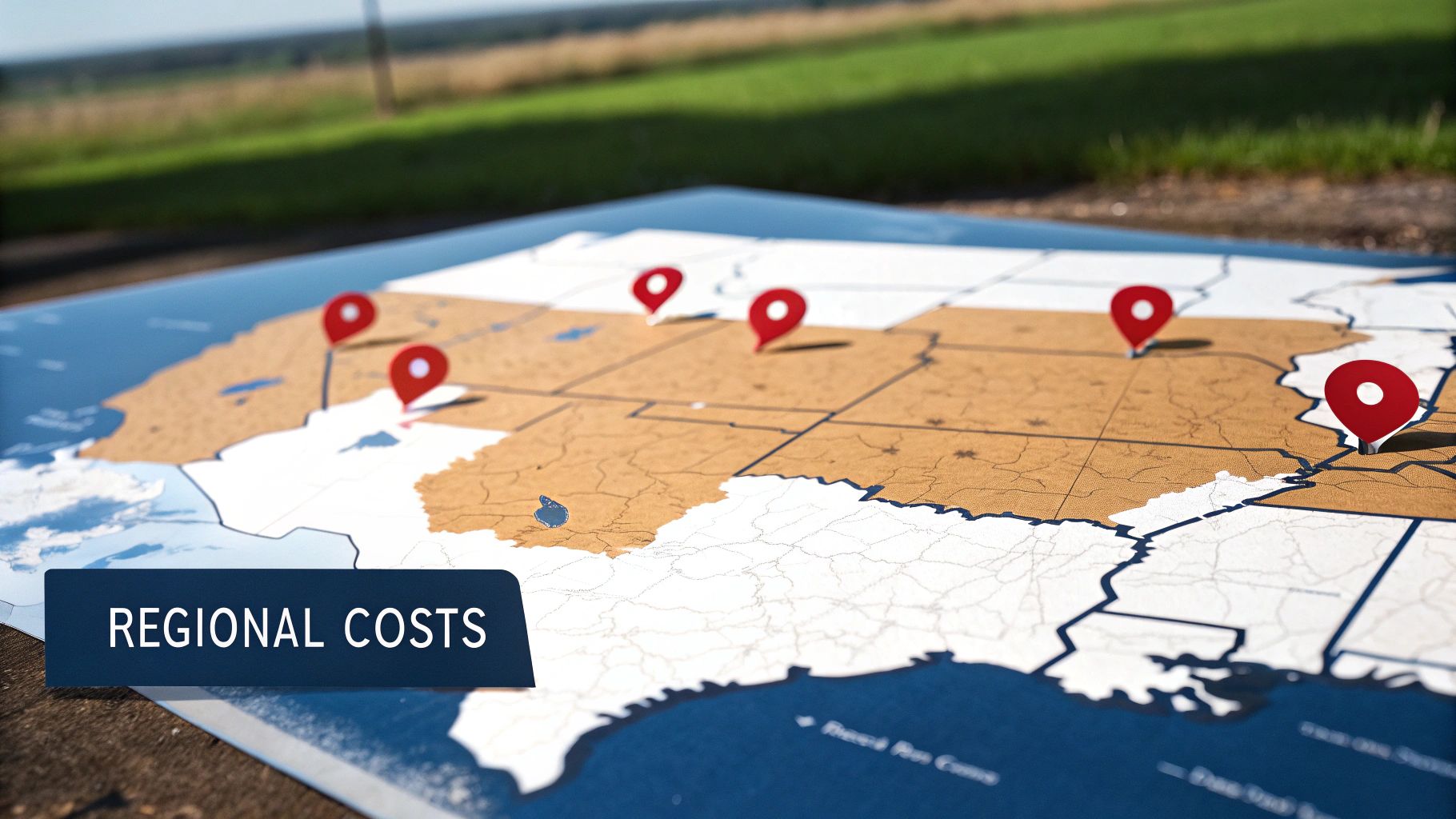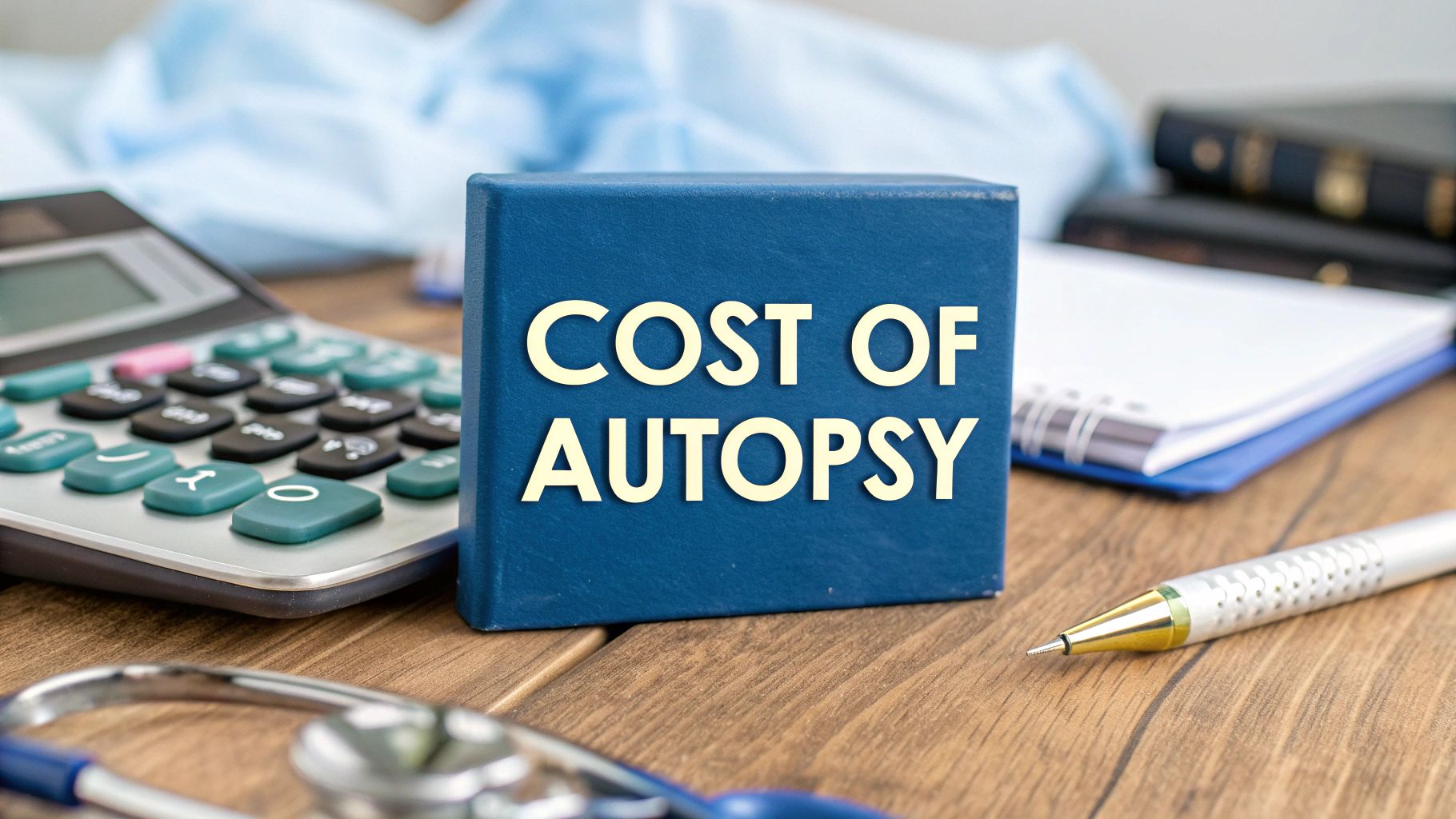Navigating the loss of a loved one is an incredibly challenging experience, and seeking clear answers about the circumstances of their passing should not add to the burden. This guide provides a factual overview of the costs associated with a private autopsy, helping you understand the factors involved in this important process.
Generally, the cost of a private autopsy ranges from $3,000 to $7,000. This figure reflects the highly specialized medical expertise, advanced equipment, and detailed analysis required to conduct a thorough pathological examination.
The final cost depends on the specific requirements of each case, such as the extent of laboratory testing needed and the logistics of transportation. Understanding this range upfront can help families make informed decisions during a difficult time.
Typical Private Autopsy Cost Range
Unlike a standard medical procedure with a fixed price, the fee for a private autopsy is tailored to the unique circumstances of each case. This is why costs may vary, even for situations that appear similar; the final price is determined by the specific examinations and logistical arrangements required.
At Texas Autopsy Services, we have moved away from itemized billing in favor of clear, all-inclusive packages. This approach is designed to eliminate uncertainty and prevent unexpected charges, allowing you to focus on obtaining answers rather than deciphering a complex invoice.
Our core fees always include essential services, such as the support of a pathologist's assistant and the use of our specialized laboratory facilities. We believe in providing complete transparency to help you through this process.
A standard private autopsy fee typically includes:
- An initial consultation and case review with a board-certified pathologist.
- A comprehensive external and internal examination.
- Standard microscopic analysis of all necessary tissues (histology).
- The preparation of a detailed final report documenting all findings.
To provide a clearer picture, the following table outlines the common services that contribute to the total fee.
Common Services Included in a Private Autopsy Fee
This table breaks down the primary services and their general contribution to the overall cost of a private autopsy.
| Service Component | Description | Impact on Cost |
|---|---|---|
| Initial Consultation | The pathologist reviews the decedent's medical history and determines the scope of the examination. | Moderate |
| Autopsy Examination | This is the core procedural work, involving a full gross dissection and analysis by the pathologist. | High |
| Microscopic Testing | Involves preparing and examining tissue samples to identify evidence of disease or injury at a cellular level. | Moderate |
| Photography & Documentation | High-quality images are taken to document important findings for the final report and legal record. | Low |
| Report Generation | The pathologist compiles all findings into a detailed, written report that is legally and medically sound. | Low |
This table covers the fundamentals, but it is important to remember that every case is unique.
A reputable provider will always provide a clear, comprehensive breakdown of your package. This transparency is crucial for preventing unexpected fees.
Certain situations may require more specialized analysis, which can affect the total cost. For example, comprehensive toxicology panels or in-depth neuropathology (brain) examinations are common ancillary services. The distance required to transport the decedent to the facility will also influence the final quote.
Other optional services might include:
- Genetic analysis to identify potential inherited conditions.
- A second opinion review by another subspecialist for complex cases.
- Extended report clarifications or courtroom testimony, if required for legal proceedings.
Factors That Shape Pricing
The final cost of a private autopsy is influenced by several key variables:
- Scope of Examination: A full, comprehensive autopsy will cost more than a limited examination focused on a specific organ system.
- Specialized Lab Tests: Advanced testing, such as toxicology or genetic analysis, requires specialized equipment and expertise, which adds to the cost.
- Decedent Transport: The distance and logistical requirements for transportation are factored into the final fee.
- Pathologist & Turnaround Time: The experience of the pathologist and the requested timeline for the final report can also play a role in pricing.
We are committed to discussing all fees, optional services, and timeline expectations during our initial consultation. This transparent approach ensures your family can plan accordingly. You can learn more about our specific services, such as Harris County private autopsy services, on our website.
Ultimately, clear and upfront pricing provides the clarity needed to focus on what truly matters: obtaining answers and finding closure.
Key Factors That Influence Autopsy Pricing
When a family considers a private autopsy, the cost reflects a service tailored to their specific questions. Each component—from the level of examination to the specific tests ordered—shapes the final price. Understanding these elements helps set clear, realistic expectations.

While the pathologist's professional services are central to the cost, other factors like specialized lab work, transportation, and administrative tasks are also included. Breaking down each component helps clarify why a thorough examination is a significant investment.
Scope Of The Examination
The depth of the pathological investigation directly impacts the fee. In some situations, a family may require a complete examination of all organ systems. In others, a focused analysis of a single organ may be sufficient.
- Full Autopsy: A comprehensive examination of all major organ systems, both externally and internally. This is the most thorough option and provides a complete overview of the decedent's health at the time of death.
- Limited Autopsy: An examination targeting a specific area—such as the heart or brain—when there is a particular concern. This is a more focused and less resource-intensive option.
The choice between these options influences the time the pathologist must dedicate to the case and the resources required.
Specialized Testing Requirements
Visual examination alone does not always reveal the cause of death. Many cases rely on laboratory analyses to identify hidden factors. These tests require sophisticated equipment and expert interpretation.
- Toxicology Analysis: Screens for the presence of drugs, alcohol, chemicals, or poisons. A basic panel screens for common substances, while an expanded panel can detect a wider range of medications or toxins.
- Neuropathology Examination: A detailed study of brain and nerve tissue, which is crucial in cases of suspected dementia, traumatic brain injury, or other neurological diseases.
- Microbiology and Virology: Identifies the presence of bacteria or viruses that may have contributed to death.
- Genetic Testing: Can detect inherited conditions that may explain the death and inform living relatives of potential health risks.
Each additional layer of testing adds valuable information and contributes to the overall cost.
Logistical And Administrative Factors
Behind-the-scenes work is essential to ensuring a compliant, accurate, and respectful autopsy process.
The experience and credentials of the pathologist are paramount. A board-certified forensic pathologist brings advanced training essential for complex cases, and their fees reflect years of specialized education and practice.
Other practical costs include:
- Transportation of the Deceased: Fees cover the secure, dignified transfer from the place of death to the autopsy facility, with costs determined by distance and specific handling protocols.
- Case Complexity and Documentation: Detailed reviews of medical records, collaboration with legal counsel, or extensive photographic documentation require additional professional time.
Every component, from transportation to administrative work, supports a meticulous and respectful process designed to deliver the clear answers families need.
Hospital vs. Private Autopsies: Understanding the Differences
When seeking answers following a death, families typically have two main options for an autopsy: one performed at a hospital or one conducted by an independent, private service. Understanding the key differences in purpose, availability, and cost is essential for making an informed decision during a difficult time.

At its core, the distinction is straightforward. A hospital autopsy is an internal procedure conducted for the hospital's benefit. In contrast, a private autopsy is a service engaged directly by the family to address their specific questions.
The Purpose Behind Hospital Autopsies
Hospitals primarily perform autopsies to answer their own clinical questions, often as a quality assurance measure. The goal is typically educational, helping physicians better understand a disease, confirm a diagnosis, or evaluate the effectiveness of a particular treatment.
Because the purpose is internal, hospitals are not obligated to offer an autopsy. In fact, many medical centers have reduced or eliminated their autopsy programs.
If a hospital does agree to perform an autopsy, it is usually done at no direct cost to the family. However, the hospital dictates the scope of the examination. Its interests—which are focused on medical education and quality improvement—may not align with a family’s need to investigate potential medical negligence or other external factors. The investigation serves the institution, not the family.
Why Families Choose a Private Autopsy
A private autopsy is a service that the family initiates and directs. This control ensures the entire process is designed to address the family’s specific questions and concerns.
A private autopsy is often the appropriate choice when you need answers regarding:
- A sudden, unexpected, or unexplained death.
- Concerns about the quality of medical care or potential malpractice.
- The possibility of a hereditary disease that could impact other family members.
- Objective evidence required for a legal case or insurance claim.
The core difference lies in who the service is for. A hospital autopsy serves the hospital's need for clinical information. A private autopsy serves the family's need for personal answers and closure.
Since it is a service engaged by the family, the cost of a private autopsy is the family's responsibility. This fee covers a detailed, personalized investigation that results in a comprehensive report tailored to their unique situation. At Texas Autopsy Services, we provide transparent, all-inclusive packages to avoid surprise charges, allowing you to focus on obtaining clarity.
Ultimately, choosing a private autopsy empowers a family to find definitive answers on their own terms. It provides a level of detail and focus that a hospital procedure is not designed to deliver, ensuring the investigation is guided by the family's needs from start to finish.
The Role of Advanced Forensic Technology
An autopsy relies on both the pathologist's skill and the advanced tools they use. A modern forensic facility is equipped with highly specialized technology designed to ensure the examination is precise, safe, and respectful. This essential infrastructure is a significant factor in the overall cost of an autopsy.

This equipment is distinct from standard medical tools. For example, specialized autopsy tables feature built-in ventilation and drainage systems. These are not merely for convenience; they are critical for maintaining a sterile environment, protecting the forensic team from biohazards, and preventing contamination of tissue samples.
Investing in advanced equipment directly impacts the reliability and accuracy of the findings provided to your family.
How Technology Impacts Precision and Safety
High-quality equipment enables a more detailed and accurate examination. When a pathologist has the proper tools, they can identify subtle pathological evidence that might otherwise be missed. This level of precision is vital for delivering definitive answers.
Key pieces of technology and their functions include:
- Advanced Imaging Systems: Digital X-rays and other imaging tools can identify fractures or foreign objects before the internal examination begins, helping to guide the pathologist's approach.
- Specialized Dissection Tools: Precision instruments are essential for delicate work, especially during the examination of the brain or heart.
- High-Resolution Microscopes: These are critical for histology—the microscopic study of tissues—which can reveal signs of disease or injury at the cellular level.
- Secure Specimen Storage: Tissue and fluid samples must be stored in temperature-controlled, monitored units to ensure their preservation for any necessary follow-up tests.
According to Maximize Market Research, the global market for autopsy tables alone was valued at approximately USD 39.01 million in 2024 and is projected to grow, reflecting an industry-wide commitment to investing in technology that improves examination quality. You can find more insights about the autopsy tables market from industry research firms.
Understanding the role of these advanced tools helps clarify why professional autopsy services have associated costs. It’s an investment in precision, safety, and the ability to deliver the most accurate conclusions possible.
The technology within a forensic facility is the backbone of the entire autopsy process. It ensures every step is handled with the highest standards of care and scientific rigor, providing families with results they can trust.
The Importance of All-Inclusive Pricing
During a time of grief, families should not have to face the additional stress of unexpected financial burdens. For this reason, we are committed to transparent, all-inclusive pricing. This approach provides peace of mind and a clear path forward when it is needed most.
Our all-inclusive model means you receive one comprehensive quote upfront that covers every step of the process. This differs from itemized billing, where essential services like transportation or specific lab tests can appear as separate charges, leading to a final bill that is significantly higher than anticipated.
With our approach, the cost of an autopsy we quote is the final price. This financial certainty allows you to focus on what is most important: seeking answers and supporting your family.
No Hidden Costs, No Financial Surprises
One of the greatest sources of anxiety for families navigating this process is the fear of hidden fees. An itemized bill can appear straightforward initially but often becomes complicated as necessary services are added as separate line items, causing the final cost to increase.
An all-inclusive package eliminates guesswork. It ensures every critical service—from the initial consultation to the delivery of the final report—is covered under a single, transparent fee.
This straightforward approach bundles all necessary components, including:
- Professional Fees: The pathologist's time and expertise.
- Transportation: The secure and dignified transport of the decedent to our facility.
- Facility and Equipment Use: Access to all specialized tools required for a thorough examination.
- Standard Laboratory Testing: All necessary microscopic tissue examinations (histology).
- The Final Report: The complete preparation and delivery of a comprehensive report detailing all findings.
An Investment in Certainty and Quality
A clear pricing structure reflects a provider’s commitment to quality and ethical care. The investment in state-of-the-art forensic tools and medical infrastructure is substantial. According to Verified Market Research, trends in medical infrastructure spending show a continued rise in investment in the kind of advanced equipment used in modern autopsy facilities. You can learn more about these trends in medical infrastructure spending to see the bigger picture.
Our all-inclusive fee represents this commitment to technology and expertise. It guarantees that our pathologists have all necessary resources to provide definitive answers without compromising quality or creating financial strain for your family. By bundling these costs, we demonstrate our dedication to making this difficult process as seamless and compassionate as possible.
How to Arrange a Private Autopsy
Once you have decided that a private autopsy is the appropriate path for your family, the next steps are more straightforward than you might expect. A professional and compassionate team is available to manage the logistics, allowing you to focus on your family. The process begins with an initial phone call.
The first conversation with a case manager or pathologist is an opportunity to voice your concerns, ask questions, and become familiar with the professionals who will be assisting you. During this initial consultation, we will determine the scope of the examination and ensure you have a clear understanding of the cost of an autopsy and what it includes.
The Step-by-Step Process
Once authorization is provided, our team takes over all coordination. You will not have to manage communications between different facilities; we handle everything.
- Coordination and Transportation: We immediately contact the hospital, medical examiner's office, or funeral home to arrange for the secure and dignified transportation of your loved one to our facility.
- The Examination: A board-certified pathologist conducts the autopsy according to the agreed-upon plan. Every finding is documented with care and precision.
- Communication with Funeral Home: As soon as the examination is complete, we coordinate with your chosen funeral home to ensure there are no delays to your family's arrangements.
Receiving the Final Report
The pathologist’s work continues after the physical examination. Tissue samples are carefully analyzed, and all data is compiled into a comprehensive written report. This document provides a clear explanation of the cause and manner of death, written to provide definitive answers. You can typically expect to receive the final report within a few weeks, which can offer the closure your family is seeking.
The entire process is designed to be as seamless and stress-free as possible. Professionals manage every detail with respect and efficiency. Your only responsibility is to provide the authorization—we will handle the rest.
The field of forensic science is continually advancing. According to Archive Market Research, the autopsy tables market is projected to grow from USD 37 million in 2025 to USD 120 million by 2033. You can read more about the growth of the forensic equipment market. This investment in technology helps ensure that every examination is performed with the highest level of precision.
If you would like to learn more about the specifics of the procedure, you can find detailed information about our private autopsy services.
Frequently Asked Questions About Autopsy Costs
When seeking answers after the death of a loved one, it is important to have clear information about costs. This section addresses some of the most common questions families ask about paying for a private autopsy.
Does Insurance Cover The Cost Of A Private Autopsy?
In nearly all cases, standard health insurance, Medicare, and Medicaid do not cover private autopsies. These services are generally not considered "medically necessary" for a living patient and are therefore not a covered benefit.
While it is always advisable to check with your specific insurance carrier, families should plan for this to be an out-of-pocket expense.
Are There Payment Plans Or Financing Options Available?
Many reputable providers recognize that this is an unexpected expense during a difficult time. For this reason, flexible payment plans or financing options are often available.
You should not hesitate to inquire about these possibilities during your initial consultation. A compassionate provider will be prepared to discuss the available options.
Will An Autopsy Delay Funeral Arrangements?
This is a significant concern for many families. A professionally conducted autopsy is an efficient process and almost never interferes with funeral or cremation services.
Most autopsies are completed within 24 to 48 hours. We coordinate directly with your chosen funeral home to ensure all arrangements proceed without delay.
In cases where autopsy findings may be used for legal matters, other financial questions can arise. For broader context, it may be helpful to review resources on understanding civil lawsuit costs and legal expenses.
We understand this is a difficult time. Our team is here to provide clear information and compassionate support. If you have further questions about the autopsy process or its costs, you may contact our team at Texas Autopsy Services for a confidential, no-obligation consultation.

